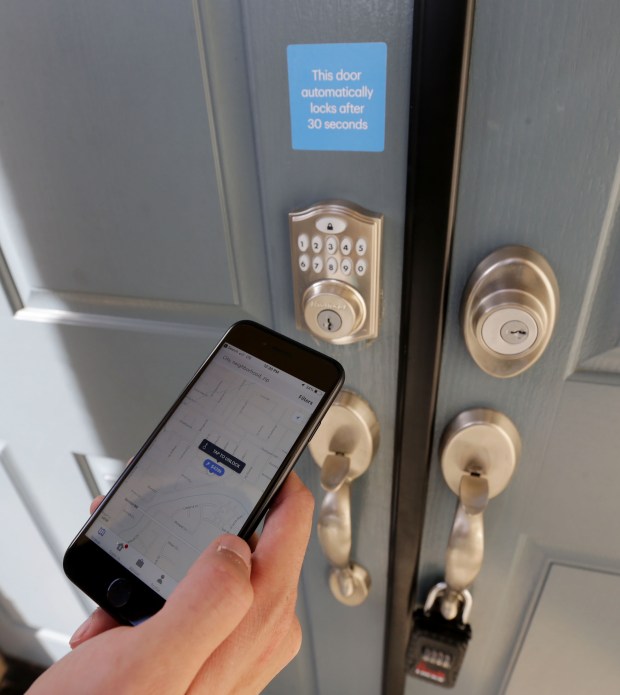By Jeff Ostrowski | Bankrate.com
Defying predictions that the iBuying concept wouldn’t work in an intense seller’s market, this new breed of homebuyers has ramped up property acquisitions to record levels.
“iBuyers,” short for “instant buyers,” mostly stopped buying homes in mid-2020 as COVID-19 injected uncertainty into the housing market. Now, iBuyers have come back strong. They’re wooing home sellers by making aggressive offers and cutting fees.
As a result, the three biggest iBuyers — Opendoor, Offerpad and Zillow Offers — hit new highs for buying activity during the second quarter of 2021, according to research by Mike DelPrete, a scholar-in-residence at the University of Colorado.
Read more: What’s an iBuyer? These companies will buy your home quicker, but at what cost?
“For anyone concerned that the iBuyer model wouldn’t be popular in a seller’s market, the evidence shows that it is resonating with consumers more than ever, and market conditions are in fact fueling its growth,” DelPrete says.
DelPrete himself was among the skeptics. With many homes attracting multiple offers, the thinking was sellers would have no trouble finding buyers — and the iBuyer pitch would fall flat.
iBuyers pay aggressive prices
Part of the reason iBuyers are finding so many takers: They’re paying a premium (as if home sellers needed any more good news in an era of super-low inventory and record-high prices).
The four major iBuyers — Opendoor, Offerpad, Zillow Offers and RedfinNow — made bids that averaged 104.1 percent of market value during the first half of the year, according to research by Zavvie, a real estate technology company that works with brokerages to help sellers compare offers from iBuyers. That’s up from 97.6 percent of market value last year.
Read more: Realtors have little to fear from iBuyers, real estate leader says
“iBuyers are paying way over market prices for homes now to buy more of them,” DelPrete says. “Why? I think a big part of it is Opendoor is a public company and needs to demonstrate strong revenue growth.”
How iBuying works
iBuyers position themselves as a fast way to sell. Homeowners avoid the hassle of painting and staging their homes. Sellers need not clean and clear out for showings. iBuyers give a cash offer, and the seller can pick a closing date. The iBuyers then spruce up the homes and quickly put them on the market for sale.
While the companies are paying full price for homes, they had been collecting fees that ranged as high as 12 percent of the sale price. The average commission for a traditional real estate sale, by contrast, is 5 percent.
However, iBuyers have been reducing fees so that they’re more competitive with traditional transactions. According to Zavvie, iBuyers’ average service fees dropped from 7.2 percent in 2020 to 5.1 percent by mid-2021.
The average concession charged for home repairs fell from 3.6 percent to 1.9 percent. In other words, the average hit for selling to an iBuyer is now just 7 percent, down from nearly 11 percent last year. Those fee cuts bring iBuyers’ fees in line with traditional sales.
Soaring home prices also have played in iBuyers’ favor. Many homeowners can’t close on another place until they retrieve the equity from their current home, and iBuyers promise fast, predictable sales.
“With supply constrained and demand so high, certainty becomes everything,” says Kerry Melcher, Opendoor’s head of real estate.
The pitch seems to be working. Zillow Offers reported that it bought a record 3,805 homes in the second quarter of 2021. That was more than twice its first-quarter volume.
“I confess to being quite excited by how well Zillow Offers is doing in such a hot seller’s market,” Zillow Group Chief Executive Rich Barton told Wall Street analysts in early August.

‘Extremely convenient’
The pitch appealed to Texas home seller Kenneth Powell. When he decided to sell his family’s house in a Dallas suburb this spring, Powell considered listing the starter home with a real estate agent. After Powell learned he’d get an identical price and pay similar fees by selling to an iBuyer, he chose that path.
Opendoor promised to close quickly — and with no caveats. “I know what a financing contingency is and what an inspection contingency is, and the whole can of worms that can open,” says Powell, a mortgage loan officer.
“Even with good preapprovals and good prequalifications, there’s still a risk that it can fall through.”
Related: Zillow launches ‘iBuyer’ operation in Inland Empire
By selling to Opendoor, Powell says, he netted the same amount he would have gotten through a traditional sale, but without the hassle of marketing the home, and without the uncertainty of an offer falling apart.
“It was extremely convenient for us,” Powell says. “We didn’t have to list our home. We didn’t have to rent a storage unit for our stuff.”
Should you sell to an iBuyer?
In today’s super-hot housing market, sellers are in the driver’s seat. With iBuyers dangling better deals than ever, should you sell to one of these companies? Some factors to consider:
—Where you live matters. iBuyers aren’t an option for all sellers. The companies haven’t been active in such cities as New York, Chicago and Boston. They’ve focused on Sun Belt metro areas like Atlanta, Charlotte, Phoenix and San Antonio.
—The age of your home matters. iBuyers tend to avoid older homes, properties that need extensive renovations and unique homes that are difficult to value. They’re mainly looking for newer suburban homes.
—Compare offers from multiple iBuyers. In many markets, Opendoor, Offerpad, Zillow Offers and RedfinNow are competing for your business. If that’s the case, ask all of them for bids.
—Talk to a real estate agent. You’ll also want to get a proposal from a traditional agent. How much might your home sell for, and what would a Realtor charge in commissions?
